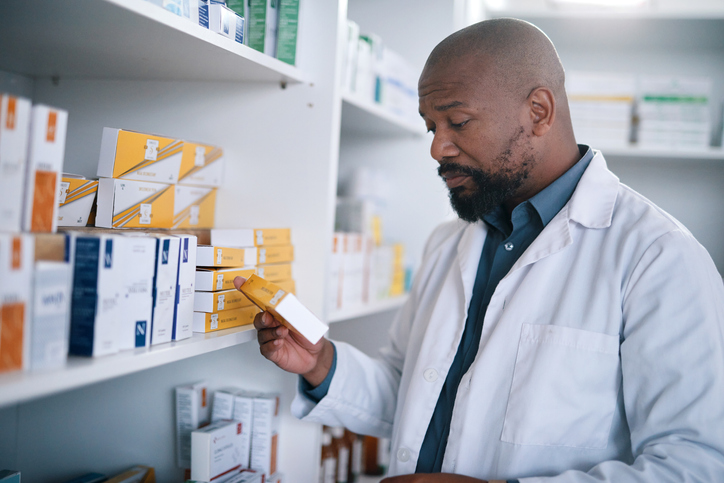Male Menopause: It's A Thing
Male Menopause: It’s Real And Here’s What You Need To Know
Share the post
Share this link via
Or copy link

Source: fotostorm / Getty
Female menopause is pretty much common knowledge. What isn’t discussed nearly as much – arguably not at all – is male menopause. Yup, that’s a thing.
It turns out that men (somewhere between 10 and 40 percent of them, says the journal Translational Andrology and Urology) will face a testosterone deficiency. This is also known as late-onset hypogonadism, andropause, androgen deficiency and – most popular – male menopause. Here’s everything there is to know about it.
Why Male Menopause Isn’t Discussed

Source: andresr / Getty
There are a number of factors that contribute to the radio silence surrounding male menopause. First off men, in general, are less likely to see their doctors for their regular checkups. Research published in The National Library of Medicine (NLM) found that men with health problems are significantly less likely than women with health problems to have had any recent contact with a doctor. Men just don’t go in for a tune-up as often as women do, so the opportunities for these phase-of-life conversations are rarer.
Love MadameNoire? Get more! Join the MadameNoire Newsletter
We care about your data. See our privacy policy.
There’s also the reality that men are not as comfortable discussing topics of an intimate nature – such as sexual dysfunction or mental health issues – with a medical practitioner. A study published by the Myotonic Dystrophy Foundation found that nearly 37 percent of men aren’t comfortable discussing topics of a sexual nature with their doctor. And the NLM also reported that men are less likely compared to women to seek mental health assistance. These two issues – sexual dysfunction and mental health decline – are often at the center of male menopause symptoms. So not surprisingly, men don’t get diagnosed with male menopause often.
What Exactly Is Male Menopause?

Source: Moyo Studio / Getty
If you want a simple way to look at male menopause, it’s like reverse puberty. As boys approach puberty, their bodies boost testosterone production. What comes next is an increase in muscle mass, a lowered voice, more body hair and an increase in sexual function. During male menopause, testosterone levels drop, and men can deal with a loss of muscle mass, a loss of body hair and even a lower sex drive. But, there is more to it than that.
MayoClinic reports that testosterone levels drop at an average of one percent per year in men ages 30 and up. During male menopause (around age 50 and up) the drop can happen more rapidly. So, men might experience physical and mental changes that they’d already been going through for decades on a mild level, but suddenly in a more severe way.
How Is Male Menopause Different From Female Menopause?

Source: LaylaBird / Getty
While there are some similarities between male and female menopause, there are important differences.
Post-menopausal men can have children. Female menopause triggers the total shutdown of the reproductive organs. After a woman has gone through menopause, she can no longer have children. That is not the case in male menopause – most men can conceivably reproduce well into their later years.
Male menopause happens slowly. Female menopause involves a decline in certain hormone levels, just like male menopause. However, for women, the hormonal change happens within a short period of time. For men, the change can be gradual and go on for years.
Not all men go through it. The most important difference is that, while all women will go through menopause, not all men go through it.
Symptoms Of Male Menopause

Source: SolStock / Getty
Testosterone levels are involved in mental and physical energy, muscle mass and the flight-or-fight response in men. As a result, when they drop, the following symptoms might occur:
- Depression
- Fatigue
- Low self-esteem
- Sleep issues
- Weight gain
- Male breast growth
- Low libido
- Difficulty achieving an erection
- Testicle shrinkage
- Body hair loss
- Hot flashes
- Low bone density
Male Menopause Treatment

Source: LaylaBird / Getty
Unless male menopause is dramatically damaging one’s quality of life, most doctors will not prescribe anything beyond some lifestyle changes. These might include:
- Getting more sleep
- Increasing exercise – including muscle-building weight lifting
- Practicing stress-relief exercises like meditation and yoga
- Eating a healthy diet
In some cases, a doctor might prescribe anti-depressants or recommend therapy for men experiencing severe depression or mental health changes as a result of the condition.
Hormonal therapy such as artificial testosterone is available. However, due to its potential side effects, it is rarely recommended.
RELATED CONTENT: Reproductive Equity Means More Men Should Consider Having A Vasectomy







